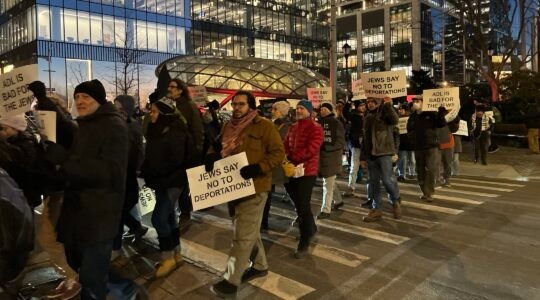BILLINGS, Mont. (JTA) – The first blizzard of the year hit Billings over the Martin Luther King Jr. weekend, but it did little to dampen the 15th-anniversary commemoration of the national tolerance campaign launched in this quiet southern Montana town.
In 1993, Billings was rocked by a year of racism and ethnic hatred. White supremacists moved in, spewing hate mail, death threats and vandalism against Native Americans, blacks and Jews.
Anti-Jewish hate flyers appeared and the Jewish cemetery was vandalized right before Rosh HaShanah. On Dec. 2 of that year, a brick was thrown through the bedroom window of a 5-year-old Jewish boy, Isaac Schnitzer, who was displaying a Chanukah menorah.
Horrified, the town responded. The Billings Gazette printed a full-page menorah, which thousands of citizens pasted in their own windows in a show of solidarity that was trumpeted by the world media as an example of how one small community stood up to hate.
The story inspired books, articles, a Life magazine photo spread and the 1995 documentary “Not In Our Town” by California filmmakers Patrice O’Neill and Rhian Miller.
That prize-winning film – and a follow-up documentary a year later – galvanized community-based tolerance campaigns based on the Billings model in hundreds of U.S. cities.
Town leaders were feted at the White House and the city received national awards from Jewish groups, including the American Jewish Committee and the Raoul Wallenberg Committee.
To commemorate the 1993 year of violence and the anti-hate campaign that followed, church leaders, police and administration officials, and representatives of local rights groups showed up the weekend of Jan. 18 to talk about how the city could still improve. A reinvigorated Not In Our Town Committee is moving forward to address lingering minority grievances.
But the Jewish community of Billings is not part of these efforts. Although it was an anti-Semitic attack that sparked the original Not In Our Town campaign, the Jews – numbering fewer than 1,000 – have been markedly absent from the ongoing movement.
The president of the city’s one Jewish congregation sat on a discussion panel at a town hall meeting Jan. 19, but the congregation as a whole did not take part in the candlelight vigil on Martin Luther King Jr. Day. The vigil was eerily reminiscent of one that took place in December 1993, when 125 non-Jews stood symbolic guard outside the Congregation Beth Aaron synagogue during Chanukah services.
Last Friday night, while two of the “Not In Our Town” films were being screened at a dinner downtown, members of the Reform congregation gathered in the synagogue to watch the 1979 film “The Frisco Kid,” where Gene Wilder plays a Chasidic rabbi sent from Europe to serve a congregation in the Wild West of San Francisco.
What happened?
The Jews of Billings have stayed on the sidelines for various reasons.
Locals say the low-key reaction to the hype has as much to do with concerns over media coverage, which tends to focus on one human story to tell a larger tale, as with the natural reticence of isolated Jewish communities anxious to blend into American society.
“People were very nice, and they put up menorahs, but all the media was really pushed,” says longtime Billings resident Sandy Sukin, speaking from her winter home in Scottsdale, Ariz.
Still, Sukin says she is proud that Billings is known for such a positive story.
The brick-throwing incident at the Schnitzer home catapulted the community into the national limelight.
“I can’t go anywhere without people saying, ‘Oh, you’re from Billings!’ ” Sukin says. “I’ve had friends who say, ‘If there’s ever a Holocaust, you can hide in our basement.’ ”
“In 1993, there were 80,000 residents and just 50 Jewish families. Most of the people in Billings had never met a Jew,” says New York psychotherapist Janice Cohn, author of “The Christmas Menorahs: How a Town Fought Hate,” a children’s book based on the Billings incident.
Tammie Schnitzer, the mother of the boy whose bedroom window was shattered, quickly became the public face of the campaign. Articulate and impassioned, she was long active in local human rights work and stepped forward vigorously when her home and family were attacked.
She acknowledges that her decision to go public was risky, and her fears were borne out. She took a lot of heat for her outspokenness and has since moved to South Carolina.
Schnitzer did return to Billings for the 15th-anniversary weekend and was a key speaker at the downtown vigil.
The morning before the vigil, she spoke to JTA at Stella’s Bakery, a local hangout not far from City Hall.
Her outspokenness, Schnitzer said, “impacted my family, I lost friends, people judged my motives. I wish others in the Jewish community had stepped in a little more quickly.”
Part of the Jewish community’s reticence stemmed from a certain unease that after a year of violence against all minorities, including the targeting of a black church and Native American homes, it took an attack against an affluent, white Jewish family to galvanize the town.
Some believe it was easier for the people of Billings to rally around the Schnitzers because it was a family much like theirs.
“Maybe this all coalesced because they were part of the mainstream community, and that’s why it felt more like an outrage,” says Donna Healy, a reporter for the Billings Gazette and a member of Congregation Beth Aaron. “It had all the elements – a young boy, a pretty, articulate mom that was already connected to the local human rights community.”
“It was really unfair,” says Tricia Williams, the president of Beth Aaron. “So much publicity in the national press centered around a cinder block flying through a window. It was horrible, it was terrifying for the family and for the wider community,” but it should be seen within the context of ongoing discrimination and violence against all minorities, from Native Americans and Hispanics in Billings.
Dr. Roxanne Fahrenwald, the congregation’s immediate past president, doesn’t think Jews are discriminated against in Billings – certainly not compared to the 10,000 or more Native Americans.
“They’re easy targets, they’re not well organized,” Fahrenwald says. “That’s why the Jewish community got the press – we were able to get organized, we’re educated, we’re articulate.”
Schnitzer agrees, saying she always felt uncomfortable with the way her son’s attack was presented as a Jewish issue.
“It was a palatable issue that left behind a lot of inconvenient truths,” she says.
Uri Barnea was conducting the Billings Symphony one November evening in 1993 when a beer bottle was thrown through his front-door window, a less-publicized precursor to the Schnizter attack. His small child was home alone with a baby sitter.
Now a Reform rabbi in Hattiesburg, Miss., Barnea understands the split in the Jewish community.
“Some people wanted to respond in a more discreet way, by talking to the authorities and the FBI,” he recalls. “Some people thought it was more important to write about it and publicize it. Both views are legitimate.”
Longtime congregant Ellen Alweis appreciated the outpouring of community support at the time.
“It was wonderful to drive through town and see all those menorahs,” she says.
Alweis attributes the congregation’s non-involvement in the Not In Our Town campaign to a lack of awareness. It is a combination of “nobody inviting us” and of not being sure what is going on or whom to contact, she says.
Another factor is that after the first year of prominent media exposure, the Not In Our Town project faded away in Billings, and has only been revived quite recently.
Not having a rabbi also makes it difficult to take part in a city-wide campaign, Fahrenwald says. A student rabbi flies in monthly to serve the congregation.
“We don’t have a seat at the table, but even if we had, we have no one to sit there,” she says.
It’s been 15 years since the media descended on Billings. The feverish attention subsided after a year or so, but the effects of the campaign and its attendant publicity continue.
In September 2005, Beth Aaron moved into a new synagogue building – one built to look like a synagogue. That wouldn’t have happened years ago, congregants say. Neither would the three-mile, public Torah procession that accompanied the move.
“We built this building as a statement of who we are,” Williams says. “We are an important part of the community. We’re much more visible. We’re not hiding. And we’ve suffered less incidents since then.”
Williams says it’s appropriate that “the conversation has changed” to reflect what’s currently going on, including discrimination against Muslims and gays. She applauds the young black and Native American activists who are taking up the reins of the town’s newly invigorated Not In Our Town campaign.
Isaac Schnitzer, now 19, enlisted in the U.S. Army. He is taking a pre-med course at a southern university and will serve eight years as a medical officer after graduation. His mother says he is observant and keeps kosher.
For Barnea, the memories “never really go away.” He suffered harassment, including death threats, when he arrived in Billings 20 years ago, when a newspaper article identified him as Israeli-born. But he came forward after the attacks of 1993, winning an out-of-court settlement against white supremacists who were ordered to leave town. The harassment ceased a few years later.
“If I’d decided not to do it because of the danger, I’d give strength to the perpetrators,” he says. “You can’t prove it, but to a certain extent the town’s reaction had something to do with the slowing down of attacks.”
Margaret MacDonald, who in 1993 was the executive director of the Montana Association of Churches – she was instrumental in getting townspeople to put up menorahs in their windows – notes that hate crimes are better prosecuted today in Billings and interfaith relations are stronger.
Now running for the Montana state Legislature, MacDonald says the Billings experience should act as a national wake-up call.
“Americans took things for granted after the civil rights movement, but we still have a lot of work to do to confront racism, homophobia, xenophobia, anti-immigration attitudes,” she says.
Invoking King’s most famous speech, she adds: “We are not yet at the Promised Land.”
JTA has documented Jewish history in real-time for over a century. Keep our journalism strong by joining us in supporting independent, award-winning reporting.





